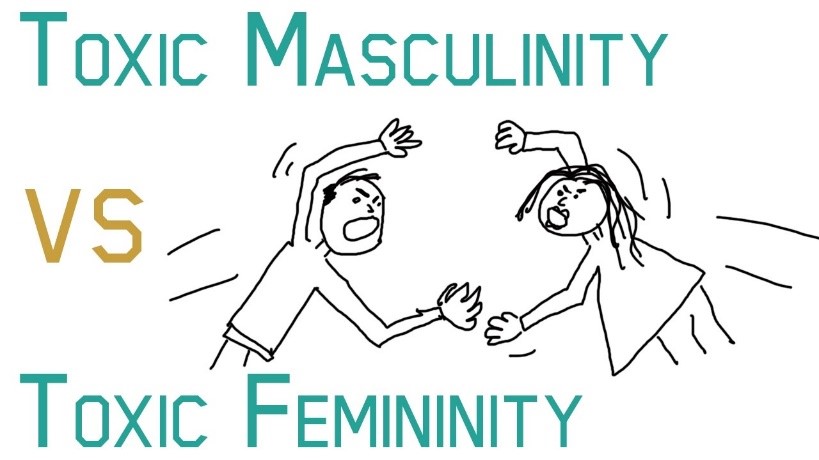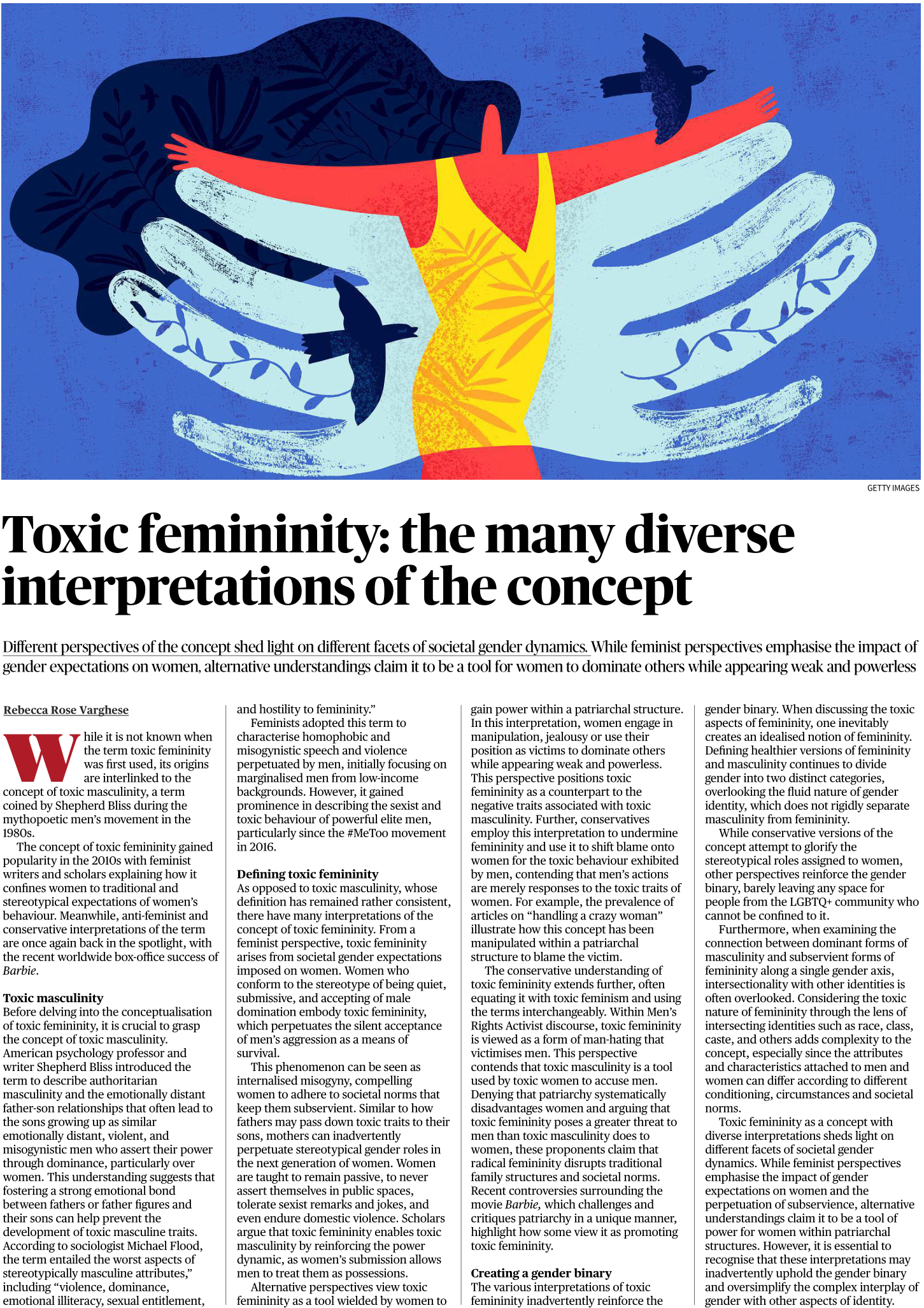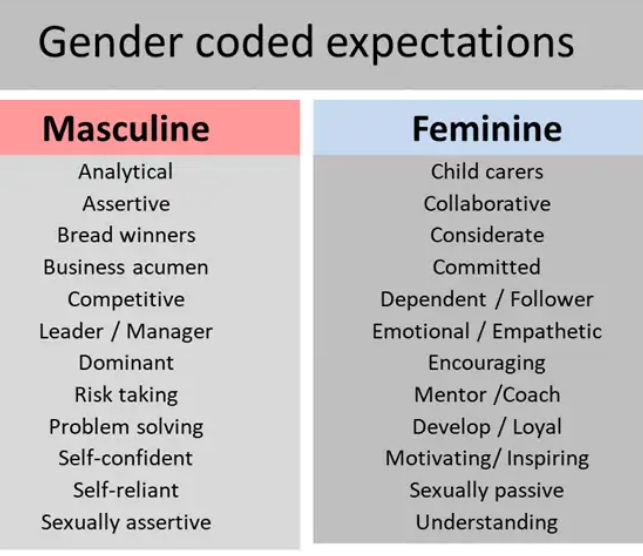Description

Disclaimer: Copyright infringement not intended.
Context
- The origins of Toxic Femininity are interlinked to the concept of toxic masculinity, a term coined by Shepherd Bliss during the mythopoetic men’s movement in the 1980s.

Toxic Femininity and Toxic Masculinity – two sides of the same coin
- Toxic femininity is a broad term that refers to a rigid and repressive definition of womanhood, including pressures women face to restrict themselves to stereotypically feminine traits and characteristics. Examples of traits that are traditionally associated with femininity include empathy, sensitivity, gentleness, and gracefulness.
- Toxic femininity refers to the adherence to the gender binary in order to receive conditional value in patriarchal societies. It is a concept that restricts women to being cooperative, passive, sexually submissive, gentle, and deriving their value from physical beauty while being pleasing to men.
- While toxic masculinity states that men should act tough, show no emotions, and reject anything considered feminine, toxic femininity pressures women to be quiet, nurturing, submissive, and attractive. “Womanhood” in this instance is defined in a very shallow manner that objectifies and harms women.

Core components of Toxic Femininity:
- Docile: This is the notion that women must be ready to accept control or instruction. They should be “flexible” in their thinking and only live to be of service.
- Hyper-femininity: This involves the strict adherence to stereotypical feminine behavior. This behavior is reinforced through punishment, such as being at fault for experiencing gender-based violence, being called a "slut," or being seen as “compromised”—for instance, confident women are often told that their attitude is unattractive or an unwomanly trait.
- Policing of femininity in others: This involves pressuring others to emulate behaviors that are seen as feminine — for example, commenting negatively over someone’s choice to remain child-free.
- Sabotaging others by abusing traditionally feminine qualities: This refers to the idea that all other women compete for male attention and recognition. In this instance, an individual may resent or act harmfully to other women as a means to prove themselves. This could be done to receive the attention of a man—perhaps a romantic interest, teacher, boss, client or male peer. Behaviors utilized can consist of: gossip, spreading rumors to discredit someone, and the threat of social exclusion.
Core components of Toxic Masculinity:
- Toughness: This is the notion that men should be physically strong, emotionally callous, and behaviorally aggressive.
- Antifeminity: This involves the idea that men should reject anything that is considered to be feminine, such as showing emotion or accepting help.
- Power: This is the assumption that men must work toward obtaining power and status (social and financial) so they can gain the respect of others.

Toxic Masculine Behavior and Toxic Feminine Behavior
|
Toxic Masculinity
|
Toxic Femininity
|
|
Peer pressure by teasing their friends that they aren’t “man” enough to do something, such as come out to drink or do a dangerous activity
|
Peer pressure through gossip and lying about other girls who aren’t at certain events
|
|
Coercing a person into having sex with them through physical means or by threatening them by calling them a slut
|
Coercing a person into having sex with them through social means or by shame, questioning their sexuality or threatening to tell other people about it
|
|
Men are physically superficial, preferring romantic partners who are conventionally and traditionally attractive
|
Women are superficial in most other ways, highly critical of each other when it comes to fashion, make up, clothing, styles, and more
|
|
Many industries are “boys clubs”, where men run the show and make women feel unwanted or not belonging
|
In more physical industries, women don’t believe they should be doing equal work to men because they are physically smaller, so they prefer to argue for the easier work
|
|
The toxic male protagonist is strong, tough, quiet, a loner, and emotionless
|
The toxic female protagonist is highly anti-male, flawless in all their attributes, is incredibly beautiful, and physically powerful
|
Impact of Toxic Femininity
- Toxic femininity, therefore, is dangerous as it posits the subjugation of women as natural and essential for social approval.
- For example, the pressure to be quiet, nurturing, and submissive can lead to women falling victim to abuse or remaining in unsafe conditions due to feeling duty-bound to stay. Furthermore, these issues also go beyond the home.
- For instance, toxic femininity in the workplace can create a hostile work environment that negatively impacts employees’ mental health.
- In addition, by blocking other women from climbing the employment ladder, toxic femininity also facilitates the lack of diversity in leadership positions.
- In essence, toxic femininity is detrimental to the fight for women’s equality as it seeks to maintain the rigid, toxic gendered power structures and systems in place today.
Impact of Toxic Masculinity
- Toxic masculinity is dangerous because it limits a person’s growth and definition of what it means to be a man. This may cause conflict within the man and his environment.
- This concept, called gender role conflict, places a strain on the man who does not meet these traits.
- When a boy or adult male views the world through the narrow lens provided by these exaggerated masculine traits, they may feel that they will only gain acceptance by living up to these traits.
- Unchecked toxic masculinity and the behaviors it can cause may lead to a variety of issues, such as:
- Bullying
- School discipline
- Academic challenges
- Jail or prison time
- Domestic violence
- Sexual assault
- Risky behaviors
- Substance abuse
- Suicide
- Psychological trauma
- Lack of friendships or genuine connections
- Some theories indicate that toxic masculinity plays a role in physical health. Toxic masculinity may prevent some men from seeking out help for possible health issues and other potential problems.
- For some males, asking for help may lead to feelings of inadequacy, weakness, and perceptions of being ‘less of a man.’
- Toxic masculinity can affect the mental health of a man.
- The American Psychological Association note the dangers of trying to adhere to these exaggerated masculine traits. Men and boys forced to cling to these traits often experience adverse effects and may face problems, such as:
- Depression
- Body image issues
- Poor social function
- Substance abuse
- Stress
- Furthermore, as feeling emotional or talking openly about feelings go against these traditional masculine values, there is the added risk that men experiencing mental health issues might not seek out professional care or even talk about their struggles with friends or family.
Issues Caused by Toxic Masculinity
Toxic masculinity manifests itself in a litany of ways:
- Competitiveness over cooperation: To some, it’s a masculine norm to jockey for greater positions of power rather than seek opportunities to cooperate. While competition can be healthy and even useful in many scenarios, toxic masculinity leads men to prioritize coming out on top above ever considering the feelings or desires of anyone else. Men can become more boorish or hard to work with as a result.
- Greater tendencies toward violence: Toxic masculinity is one reason for the amount of male violence throughout society. Since some men refuse to handle their emotions in a healthy way, conflicts between partners can unravel into domestic violence. Similarly, some men might even turn to sexual assault.
- Higher levels of homophobia and transphobia: Heterosexual, cisgender men who don’t make an effort to combat toxic masculinity might hold biases against people of different sexual orientations and gender identities. Toxic masculinity insists on there being only one way to be a man and excludes or even denigrates any other approaches.
- Inability to admit vulnerability: When someone tells a young boy to “man up,” the implication is generally for them to hide their emotions and return to the task at hand. From a young age, this instills the belief you can’t be a “real man” if you admit any sense of vulnerability. As a result, many grown men refuse to seek mental health care or ask for any sort of emotional support, leading them to manage their internal state in a counterproductive and damaging way.
- Increased sexism toward women: Toxic masculinity is practically synonymous with misogyny. Men who take this attitude to heart believe masculinity is innately superior to femininity, leading them to rely on untrue and harmful gender stereotypes in their interactions with women. In extreme cases, this can lead to outright sexual harassment. On a more muted level, it might emanate through “mansplaining,” condescension, or advocating for continued disparities between men and women throughout society.
- Inordinate senses of entitlement: Toxic males experience a sense of entitlement in their work, relationships, and other areas of life. This can eventually lead to mental health problems like narcissism and delusions of grandeur. Young men might feel they can engage in excessive risk-taking without consequences because of this attitude. The concept of toxic masculinity can even lead to wanton violence, up to the point of some men even committing violent crimes and expecting no retaliation.
- More repressed emotions: A lack of emotional expression and management lies at the heart of toxic masculinity. Certain men trade any ability to effectively manage their mental health issues in the pursuit of constantly exhibiting stereotypically masculine traits. Underneath the tough, sometimes cruel exterior often lies someone in a great deal of emotional pain with no resources or understanding of how to handle these feelings. For that matter, bottling up all these emotions can affect a man’s physical health as well.

Combatting Toxic Masculinity and Toxic Femininity
- We need to teach young men from an early age that it’s good to express emotions.
- In both our education system and at home, we need to help boys and men label their feelings and understand them.
- By approaching this in a non-judgmental, curious way, we can eliminate the fears surrounding therapy and mental health.
- We need men to be role models for the new generation. It all starts with teaching boys to not be men but to be humans.
- One true way to combat toxic femininity is to encourage everyone to be their authentic selves and not the version of themselves they feel compelled to be in their work environment.
- Culturally defined concepts of binary-gendered norms have changed over time and will continue to evolve. Given that gender is a social construct, we should continue to challenge the parts of the definition that do not work for us as individuals.
|
PRACTICE QUESTION
Q. Culturally defined concepts of binary-gendered norms have changed over time and will continue to evolve. Given that gender is a social construct, we should continue to challenge the parts of the definition that do not work for us as individuals. Justify.
|
https://epaper.thehindu.com/ccidist-ws/th/th_delhi/issues/48879/OPS/GRABLDDHD.1.png?cropFromPage=true
















